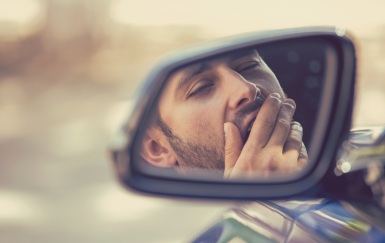
Men and young drivers are the most likely to be at risk from drowsy driving
Insurance bears brunt of crash costs of at least £175.5m a year
One in eight (13%) UK drivers admit falling asleep at the wheel, according to new research by the AA Charitable Trust.
And nearly two fifths (37%) say they have been so tired they have been scared they would fall asleep when driving.
If a drowsy driver causes a collision the brunt of repair and injury costs to third parties would fall on their insurer which, for life-changing injuries could run to a seven-figure sum. Such collisions are often especially serious because a driver who has dozed off wouldn’t use the brakes or take other evasive action before crashing.
Drivers involved in a crash because they fell asleep are likely to be prosecuted and, if someone is killed, the prosecution will be for causing death by dangerous or careless driving. Apart from loss of licence, heavy fines and possible custodial sentence, drivers would find extreme difficulty and high cost of obtaining car insurance in the future – quite apart from having to live with the consequences of having dozed off at the wheel.
The latest road casualty statistics show drowsy drivers contributed to 53 fatal and 351 serious crashes in 2017.
Based on Department for Transport figures, the cost of these crashes amounts to about £175.5m.
However, it is widely accepted the true figure for fatigue-related crashes is much higher due to under-reporting. In fact, it is estimated that up to 25% of fatal accidents are caused by drivers who have fallen asleep at the wheel4. Statistically crashes due to drowsy driving are most likely on monotonous dual carriageway roads or motorways and in the small hours of the morning5.
The research has been launched today (02/11) as part of a nationwide campaign to alert drivers to the dangers of drowsy driving.
Men are three times as likely as women to say they have fallen asleep at the wheel (17% compared with 5%).
And young drivers, aged 18-to-24, are the most likely to say being very tired does not affect their driving ability (13% compared to 2% of all drivers). They are also the most likely age group to say they normally carry on regardless if they feel tired while driving (18% compared to 3% of all drivers).
Drivers who have been affected by tiredness say:
- Over half (57%) stopped for a break as soon as they realised they might be too tired to drive (just 34% of 18-24-year olds said this)
- A third (36%) said they felt fine when they started their journey and their drowsiness took them by surprise (higher among young drivers at 45% for 18-24-year-olds)
- One in ten (11%) knew they were tired when they began their journey (29% of 18-24-year olds; 15% of women and 9% of men)
- More than a fifth (23%) said they had been driving for more than two hours without a break when they were affected by tiredness (25% of men and 19% of women)
The top five reasons for driving tired are:
- A long/hard day at work (39%)
- Monotony of the journey (33%)
- Late night driving (27%)
- Trying to cover too much distance in one day (27%)
- Lack of sleep the night before (26%)
The AA Charitable Trust is calling on drivers to be alert to fatigue, reminding them that if they find themselves winding down the window or turning up the radio that these are a symptom of tiredness – and not an effective remedy. Drivers doing these things need to take it as a sign they are too tired and need to stop at the next safe place; have two cups of coffee (or equivalent caffeinated drink) and nap for around 15 minutes.
Research shows 17% of visitors say they felt tired when arriving at a motorway service station, but this fell to 11% on exit.

